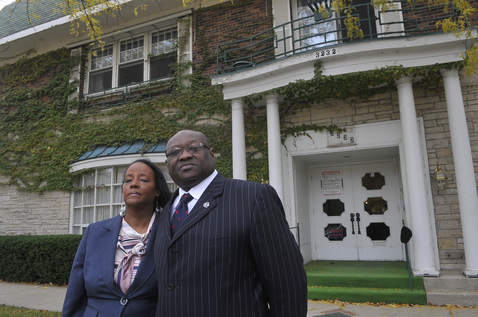A historical South Side landmark where a Civil War training camp once housed black soldiers recruited for the Union Army — along with Confederate troops captured in Union victories — will finally get formal recognition Monday.
State and local officials will dedicate a site in the Gap neighborhood that once was part of the notorious Camp Douglas, a Union Army training and prisoner of war camp, established in 1861 on the land between Cottage Grove Avenue and King Drive, 31st and 33rd streets. That was where 6,000 Confederate soldiers died of disease and cold before the Civil War’s end in 1865.
A new historical marker will be installed Monday morning commemorating Camp Douglas at 3232 S. King Drive, where the long-shuttered Griffin Funeral Home, owned by alternative school network Prologue Inc., now stands.
“We’ve just been thrilled to call the historic site our new home,” said Nancy Jackson, CEO of Prologue, which acquired the site from Griffin heirs Dawn Griffin O’Neal and her husband, Jim O’Neal, in 2012, with plans to open up an alternative school later thwarted by the Cap Community Organization.
“Many of our staff are historians, and this site is part of African-American history from the Civil War to the civil rights movement. It’s very exciting to be located on the grounds where African-American people came through, were recruited and joined the Union cause,” Jackson said.
In 1965, Ernest Griffin purchased what was then a china factory that sat on the site near Lake Meadows. But it wasn’t until 1978 that he learned about Camp Douglas, discovering that his grandfather enlisted there and that he himself was born in the area of the former camp.

He set out to learn all he could about the Civil War, becoming an expert and amassing a grand memorabilia collection before his death in 1995. The Griffin Family Trust, which closed the funeral home in 2007, had rejected many developers’ proposals for the prime land but finally sold it to Prologue with an agreement that it would open a Civil War museum on the campus honoring African-American soldiers.
The Chicago-based Camp Douglas Foundation had long advocated for a museum on the site.
“What we’ve always wanted to do is educate the community about the history of what’s in their neighborhood,” said Bernard Turner, a director of the foundation.
“During the course of the Civil War, when there were victories over Confederate troops in the South, they sent them to Chicago to be housed in Camp Douglas. But the original purpose of the camp was to recruit and train Union soldiers, which included African-American soldiers,” he said. “Because so many troops died in the camp, people think of it in a negative way, but they shouldn’t because this camp contributed to the Union victory that led to the end of slavery.”
The foundation will develop the museum on a portion of the Griffin site — a recreation of the barracks of Camp Douglas, filled with artifacts that have been collected in archaeological digs on the site and on the grounds of Pershing West Middle School directly across the street.
The O’Neals donated Griffin’s collection to the museum, which was being catalogued by the Newberry Library.

Ernest Griffin had gained infamy by flying a Confederate flag on his property — alongside flags of the United States, Africa and a P.O.W. flag.
In 1990, at a ceremony attended by Daley and then-Ald. Bobby Rush, the funeral director installed a Heritage Memorial Wall in his parking lot to honor those who died in the camp, along with a property marker nothing this is the “site of enlistment of Private Charles H. Griffin, Jan. 5, 1864, Co. B. 29th Reg., T. U.S. Col, D Infantry USCT.”
Griffin’s grandfather served in Company B of the 29th Regiment of the U.S. Colored Infantry, the first African-American Union Army division in the state of Virginia.
Prologue’s plans to house a school at the site that it bought for $2 million was thwarted when the predominantly upper-income Gap Community Organization rejected the idea of a school for former dropouts in their neighborhood. In the Gap — an oasis in the mostly low-income Douglas community — limestone rowhouses and tidy brick townhomes average $600,000.
See previous story.
“The community didn’t leave us with a lot of choices,” said Jackson, complaining that it took 245 days to obtain the group’s construction permit, which was approved last month.
Plans now call for the Bronzeville Community Development Partnership to locate an entrepreneurship incubator at the site.
“This site has been retrofitted for so many things, and we are all a part of this heritage,” said the Partnership’s Paula Robinson. “This is a fitting location for us as we focus on entrepreneurship and in particular, tourism, to bring people to see the area also once known as Chicago’s Black Belt.”

